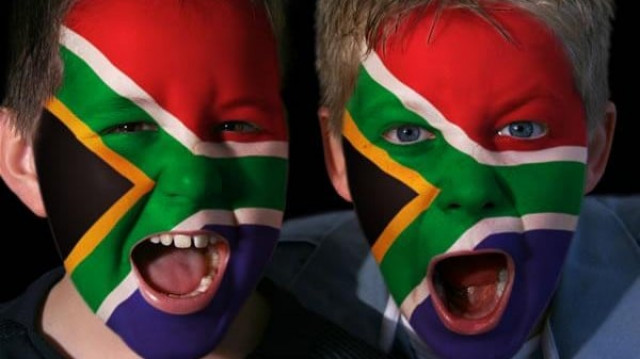The 2010 World Cup officially began two weeks ago, but in reality had begun for South Africa since 2004. There are six different (language) versions of the official world cup anthem 'wave your flag.' They all feature K'naan and have the same cheering crowds, bright colours, contagious excitement, obligatory celebration of nationalism and of course, all celebrate the flag.
They all sell patriotic pride
K'naan collaborates with Nancy Ajram to produce the Arabic version, with David Bisbal to produce the Spanish version, with Jacky Cheung and Jane Zhang for the Chinese version, with Féfé for the French version. Skank did a Portuguese version for Brazil. It gets better, wait for it. There's an Alvin & the Chipmunks version even.
Toasted as a highly inspirational song, re-mixed and sung in six different languages, and counting. This official World Cup version, which seems to have been taken up by everyone, is a compromised, co-opted, Coca-cola-ized version of the original. The original lyrics speak more to struggle against poverty and violence, in pursuit of freedom. Were they too real for the World Cup?
I have rejected the new version and this is why
I'm fundamentally against flags and the problematics they posit. I'm against the usage of flags to whip entire populations into a jingoistic hyper-exclusive frenzy. It is dangerous to attribute so much emotion to fluttering pieces of cloth or paper, especially when imbued with ripe emotion and ego. Flags have in recent times become markers of gauging national pride; whoever doesn't hoist the national flag on independence day, or some other day of national celebration or during moments declared as national crisis, is not supporting the nation. Those who do are celebrated for their loud visible, albeit unimaginative commitment to the nation. One argues that the flag needs to be recovered from this simplistic binary of exhibition and absence.
However, before attempting to reclaim the flag, certain fundamental questions must be asked and answers or further questions must be sought and examined. Who does the national flag of a nation really represent? Who does it serve and protect? Who does it actively and passively reject? How many people can actually claim ownership of a flag that claims to represent them? In conflicted times, the flag represents a determined conviction in ‘We, the People.’ The tireless question remains though – who are these people?
Watching FIFA 2010 matches for the past two weeks has most certainly been ironic. Watching different lineups for different teams, wearing national colors, roused by flags - a celebration of multiculturalism is what the sponsors would have us believe. The matches have shown USA being represented on the field mostly by men of colour, of African-American and/or Latino heritage, Britain and France being represented by men of African descent, Germany's side being carried by Turkish starters and one man of African descent. Is this the irony of "nationalism" in a transnational world, where some of the best players of western countries are migrants and/or minorities?
Of course not all migrants and/or minorities are rendered as the de facto ‘Other’ in Western societies. However, the right to privileges of citizenship, to rightfully work and live with security wherever people migrate to or settle down is not fully respected or legally granted by most nation-states. As societies become more diverse, the nation-state is in danger of becoming more partisan and parochial.
One will note that in some of the national Western teams such as England, France, Switzerland, USA, etc. the player lineups are ethnically, racially and religiously diverse, indeed representative of immigration patterns to the Western Hemisphere. While the player lineups are heralded as the success of multiculturalism, one must consider the repressive immigration laws and fear of immigration groups’ inability to assimilate as a real threat to paralyzing any kind of significant integration. Which communities based upon their nationalities, ethnicities, races, and religions are being included under the fold of the flag and which are being excluded?
It is incongruous that these nation-states continue to introduce more draconian legislature with regards to immigration and citizenship, and are becoming bastions of intolerance and xenophobia. This is heightened by class, race, ethnic disparity, and plagued by white supremacy and tokenized diversity. The recent immigration law passed in Arizona, SB 1070, seeks to criminalize immigrants, enforcing drastic new measures of deportation, and increasing racial profiling. It also codifies distinctions of legality and illegality of people based on presupposed notions of who might be a harbinger of terrorism and violence.
Immigration laws in France with regards to immigrants from North and West Africa, and more recently, Muslims, have become more reductive and stringent. Migrant workers in France have little to no rights at all, are often targeted by the police and are victims of xenophobia in French society that interprets immigrants as job-stealers. In 2005, there were three weeks of rioting, after the electrocution of 2 teenagers of African descent who were hiding from the police in an electrical sub-station. A report published in 2009 by the Berlin Institute for Population and Development, showed Turks to be the least integrated group of immigrants in German society and least successful in securing employment.
The most integrated group in Germany, according to the Berlin institute, is immigrants from other EU countries. The Italian side’s lack of diversity in terms of reflecting immigrant and minority communities is perhaps emblematic of the state’s abysmal record with immigration laws. Italy has recently been embroiled in race riots fuelled by mafia controlled labor practices, which have oppressed migrant workers for decades.
The World Cup has already been impacted by race and ethnic dynamics
In the final match of the 2006 World Cup, Zinedine Zidane (France) provoked by Marco Materazzi (Italy) headbutted him ten minutes before the end of the match to be sent off with a red card. Zidane spoke to the press apologizing for the consequences of his action, but not apologetic for the action itself. Zidane claimed Materazzi used racial slurs and insulted Zidane’s mother and sister. Race and ethnicity have clearly been played out on the field and have become part of the aggression that opposing team players show to one another.
Perhaps we have not fully embraced multiculturalism yet; hence some of us are still deconstructing the flag and problematizing the dynamics of real life being played on the football field. Perhaps we need to check ourselves, reminding ourselves of how ridiculous our notions of nations and citizenship are – when we think of only White men playing for Western nations, when clearly those nation-states have increasingly diverse populations. However, our understanding is based in the identification of a national character, its heroes, its wealth, its dreams, and its enemies.
If state policy continues in its heavy-handed oppressive legislature towards minority immigrant communities, then we have no choice but to continue to think of them as being removed from under the flag. Specific immigrant communities have continued to be cast as the 'Other' and never been re-cast as anything else. This has obvious race, religious, ethnic implications. The dichotomy continues to exist, and integration continues to be "their" problem.
A transnational World Cup
For now, instead of a national World Cup, we find ourselves beholding a transnational World Cup. Some of the players facing off for the World Cup play on the same side, for the same club professionally. Currently, only England, Germany and Italy have teams that play solely for national clubs. The Algerian side boasts of only a handful of players who were actually born in Algeria.
It is always an interesting unraveling when international football players who build reputations with European clubs are recalled (once every four years) to play for their national team. While FIFA is still peddling national pride in the World Cup as playing for one’s nation, transnational linkages and immigrant baggage have complicated these emotional claims of belonging.
Maybe instead of re-claiming or waving a flag, we need to get rid of it altogether.
Multi-Culti Mundial?



COMMENTS
Comments are moderated and generally will be posted if they are on-topic and not abusive.
For more information, please see our Comments FAQ